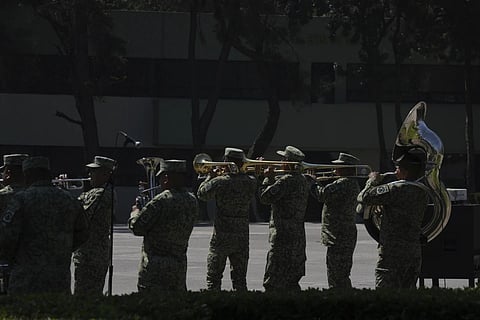
- LIFESTYLE
- FASHION
- FOOD
- ENTERTAINMENT
- EVENTS
- CULTURE
- VIDEOS
- WEB STORIES
- GALLERIES
- GADGETS
- CAR & BIKE
- SOCIETY
- TRAVEL
- NORTH EAST
- INDULGE CONNECT

At a military base in Mexico, camouflage uniforms aren’t just worn for combat—they now accompany a brass band and a microphone. Leading this unexpected performance is Captain Eduardo Barrón, a 33-year-old army officer who performs under the stage name “Eddy Barrón.” Rather than singing of violence and outlaws, Barrón belts out songs that honour soldiers, express national pride and call for peace.
He’s part of a growing cultural effort to reshape corridos, a Mexican musical tradition with deep historical roots but a modern reputation for glorifying cartel violence.
Corridos first emerged in the 19th century, blending traditional instruments with storytelling to chronicle events of war, revolution, and migration. They became an essential means of passing down oral histories, particularly in a country where literacy was once scarce.
Over time, the genre evolved—first capturing tales of smuggling during the 1920s Prohibition era, and later giving rise to the now-infamous narco corridos, which glamorise drug lords and criminal lifestyles.
But today, a new wave is taking shape, and Eddy Barrón is at its forefront.
“Narco life is in style and they make it sound really pretty … but the reality is different,” Barrón says. His approach isn’t about banning or silencing the genre. Instead, he seeks to “reclaim it” by updating its themes, preserving its form while changing its focus.
Originally meant to boost military recruitment and entertain troops, Barrón’s songs are now public, with YouTube music videos featuring him in full uniform, surrounded by barbed wire, heavy-duty weaponry, and the Mexican flag. His lyrics, however, shift away from aggression and instead reflect themes of family, sacrifice, and national service.
The Mexican military began supporting the release of his songs in 2023, during a cultural moment when corridos tumbados—a trap-influenced version of the genre popularised by artists like Peso Pluma—surged in popularity.
This cultural reset comes amid heightened concern over the impact of narco corridos. Several Mexican states have imposed bans on live performances, and some musicians have even faced death threats, allegedly from rival cartels. Concerts have been cancelled, and investigations launched against performers.
Just last week, controversy erupted when an image of cartel boss Nemesio “El Mencho” Oseguera was projected behind the band Los Alegres del Barranco during a music festival in Jalisco—mere days after authorities linked his group to a ranch under investigation as a cartel training camp.
This incident triggered widespread backlash and prompted further bans, as well as calls from President Claudia Sheinbaum for artists to embrace music that promotes peace and denounces violence.
Barrón insists that he’s not trying to invent something new but rather return to the genre’s original spirit. “Corridos come from the revolution, and we’re doing the same thing those soldiers did — telling real stories.”
His military-themed ballads are carefully crafted to inspire pride without glorifying conflict. One song recalls the day he joined the army, singing: “This is a dream my soul longed for, and if I were to live another life, I’d become a soldier again.”
While some are sceptical of government involvement in shaping cultural output, academics say there’s space for multiple narratives in corrido music. “There are a lot of songs that sing of peace and love,” says José Manuel Valenzuela, a Tijuana-based sociologist. “They just aren’t the ones topping the charts—because we’re living in a moment of aggrieved youth.”
With more tracks planned for release in 2025, Barrón remains hopeful. He views his project not as a rejection of corridos’ rawness, but as a reinvention that could steer Mexican youth away from romanticised violence and towards a more honourable future.
“We’ve been stuck with this label of corridos as negative music,” he says. “But a better approach is to reclaim the genre and shift the conversation.”